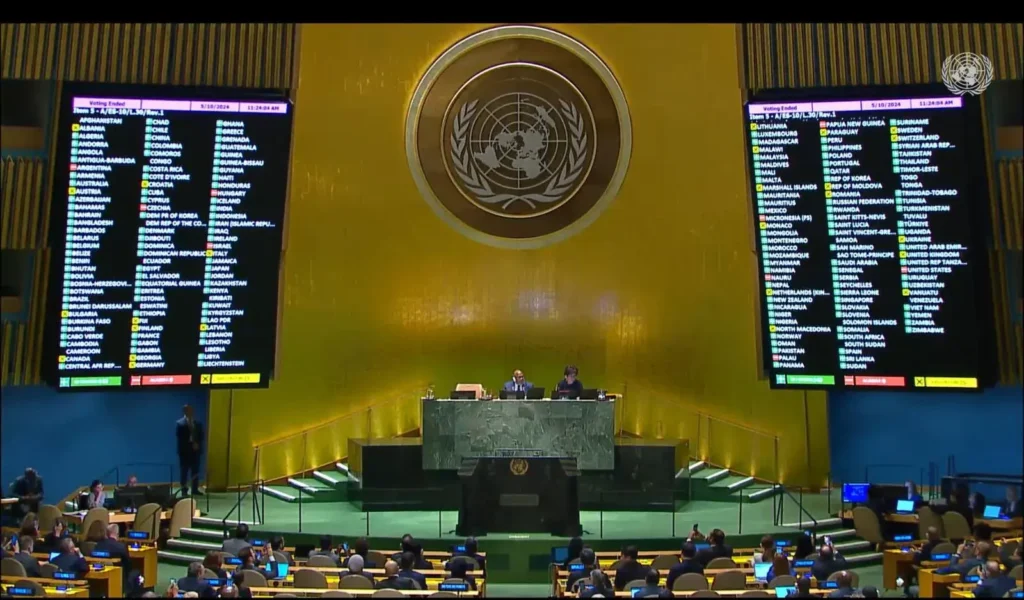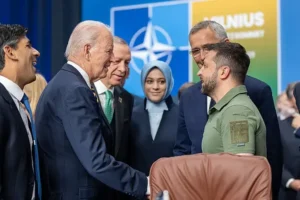The resolution project urged the Security Council to reconsider the veto issued by the United States, the legal barrier preventing Palestine from occupying a seat in the UN with the right to speak and vote.

The United Nations General Assembly has endorsed the full membership of the State of Palestine with 143 votes in favor, 9 against, and 25 abstentions.
Countries voting in favor included, among others: Bolivia, Brazil, Chile, China, Colombia, Cuba, Egypt, Spain, France, Greece, Guatemala, Honduras, India, Iran, Ireland, Japan, Mexico, Nicaragua, Oman, Panama, Peru, Portugal, Qatar, Russia, Saudi Arabia, South Africa, Syria, Uruguay, Yemen, and Venezuela.
The nine votes against were cast by: Argentina, Czech Republic, United States, Hungary, Israel, Micronesia, Nauru, Palau, and Papua New Guinea.
The 25 abstentions at the time of voting were: Albania, Austria, Bulgaria, Canada, Croatia, Fiji, Finland, Georgia, Germany, Latvia, Italy, Lithuania, Malawi, Marshall Islands, Monaco, Netherlands, North Macedonia, Moldova, Paraguay, Romania, Vanuatu, United Kingdom, Ukraine, Sweden, and Switzerland.
Legally speaking, the resolution project urged the Security Council to reconsider the veto issued by the United States, the legal barrier preventing Palestine from occupying a seat in the UN with the right to speak and vote.
However, from a perspective grounded in realpolitik and the international stage, the 143 votes indicate that the vast majority of the General Assembly—more than two-thirds—support granting the State of Palestine a voice and vote in the UN.
Before the vote, Palestine’s representative to the UN, Riyad Mansour, requested the project’s approval with a speech that challenged the legitimacy of Israel’s attacks on the Gaza Strip, following the terrorist attack by Hamas on October 7, 2023.
“We seek freedom and justice for peace,” Ambassador Mansour stated, without referring to the ongoing attacks by Hamas. He added, “Israel has committed a massacre in Palestine; they do not want us to exist.”
Subsequently, Israel’s ambassador, Gilad Erdan, condemned—in advance—the vote in favor of Palestine. “Today you are going to promote a Palestinian terrorist state. This week the Holocaust was commemorated, and precisely this week, you have decided to honor modern-day terrorists. How can you be so blind?” Ambassador Erdan declared.
He concluded: “You are about to grant privileges and rights to the future terrorist state of Hamas, to our times’ Hitlers. I said Yahya Sinwar, the terrorist leader operating from Gaza. He will be the president of Palestine.”
The resolution project discussed at the Emergency General Assembly was co-sponsored by over 40 countries, including Brazil, Bolivia, Chile, Honduras, Colombia, Cuba, Nicaragua, Peru, Venezuela, China, Spain, Lebanon, Jordan, Qatar, Saudi Arabia, Oman, South Africa, and Kuwait.
On April 18, the Security Council addressed a request from Algeria proposing the full membership of Palestine in the UN. This initiative received 12 votes in favor, one against (United States), and two abstentions (United Kingdom and Switzerland).
The United States’ refusal blocked Palestine’s access and determined that Algeria’s resolution project would reach the Emergency General Assembly. The United States vetoes because it believes that Palestine’s recognition as a full state should be the consequence of a peace agreement with Israel.
In this context, the vote in the General Assembly took place, favoring Palestine.







